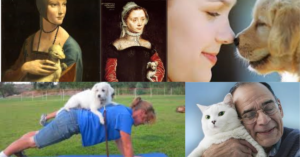Our bonds with animal companions have deepened significantly in recent decades. The connection we share with pets today seems different, or perhaps the profound bond we have always felt is now more widely acknowledged.

A striking 70% of pet owners report sometimes sleeping with their pets. This is a marked shift from the days when dogs were typically chained in yards and cats roamed barns. While many animals still live that way, the notion of “co-sleeping”—a term borrowed from Attachment Parenting research for human babies—suggests benefits that might also apply to pets. When babies sleep with their parents, they experience bonding on a brain level. Could the same be true for our pets? It seems likely.
Furthermore, 23% of pet guardians cook special meals for their pets, deriving pleasure from seeing their companions enjoy the food. This “unique bond” reflects the deep emotional connection between humans and their pets.
Interestingly, 40% of married women with pets claim they receive more emotional support from their pets than from their husbands. This statistic might amuse some, but it also highlights the unparalleled support pets can provide. When the human-animal bond is strong, it’s challenging for human relationships to compete.
During Hurricane Katrina, a significant number of people refused to leave New Orleans because they didn’t want to abandon their pets. This choice underscores the profound bonds people have with their animal companions.
Today, about two-thirds of U.S. households have at least one pet, an all-time high. Historically, humans have lived with animals like farm animals and hunting dogs, but these animals weren’t considered family members as pets are now. While aristocratic ladies once had lap dogs and ferrets, pet ownership was largely a luxury for the wealthy.
Interestingly, some people kept dogs in their beds during the Great Plague to attract fleas and avoid the plague themselves. However, the idea that every family benefits from having a dog or cat is relatively new, gaining popularity post-World War II with cultural influences like the Lassie Show.
As our society has become more indoor-oriented and sedentary, many of us suffer from “Nature Deficit Disorder.” Without pets, we might rarely interact with animals. Pets fulfill a deeply ingrained need for animal companionship, connecting us to nature.
The term “pet parent” emerged only a decade ago, reflecting the evolving perception of pets as family members. People now refer to their dogs and cats as “my baby” or “my soul mate.” What has changed in our evolution to create such deep connections with our pets? This phenomenon signals a significant shift in the way we relate to our animal companions.
